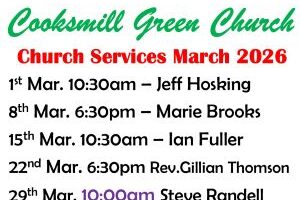Thought for the Week 18th July 2021
How Does Faith Help Me Cope?
I cannot imagine that there is anybody reading this today who has not been affected in some way by the event that we now commonly call the Covid Pandemic. The last 15 months have challenged and altered all that we might regard as ‘normal’, especially in the way we might choose to live our daily lives. There has been a constant dialogue concerning the statistics that have steered the global response to control the spread of the virus and we are now very used to daily updates on how many have been infected, hospitalised and sadly died in order to determine the risk to both our public and personal health. It is only recently though that the Covid dialogue is now introducing the next risk to consider, that of the psychological impact upon our mental health. Prolonged periods of imposed social control measures have seen us endure a domestic confinement that has caused isolation, anxiety, stress, loneliness, even perhaps an apathy towards a life that we feel we no longer control and of course who knew how much the value of a loved one’s hug could mean, until it was denied to us. This lengthy exposure to such negative emotional stimuli exacts a price upon what we call our ‘wellbeing’, and that term is creeping into daily conversations more and more in a good way as people begin to realise that they not only need to talk about it, but want too as well, which is something we generally are not very good at if we are being honest.
It was for this reason that I was recently asked to deliver a local sermon on ‘wellbeing’ and how our faith might help us to deal with all those negative emotions of Covid. I did some research and found that psychologists make much of what they call ‘coping mechanisms’ which is something we all possess (even if we cannot always recognise them) in order to survive the psychological pressure found in the life that we lead. These coping mechanisms take many forms and are tailored to our individual perceptions of how we fit into the world, which is an important fact to bear in mind, as what is good for you may not necessarily work for the person beside you and vice versa, so trying to impose your idea of how to cope onto someone else often doesn’t work and can actually do more harm than good, basically it means that sometimes just simply listening is better than telling.
My approach to the given topic of how faith helps us deal with life, was to ask myself what life would be like if I didn’t have a faith, if I woke up tomorrow and simply decided that God no longer existed for me. I would recommend this as a deeply introspective method of both reflecting on and evaluating, your own relationship with God by simply asking yourself “what sort of person would I be or who would be my guiding light, if God didn’t exist?”. The results can give sobering insight into what perhaps you may take for granted in believing that He does.
After deeply pondering on the matter, I came up with five coping mechanisms that faith provides me and tried to imagine a life without them. You may find they are the same ones for you too or you may discover others, either way they are something to think about in the week ahead.
Forgiveness – In the forgiving of others we release ourselves from the cold chains of all those negative feelings we may harbour, feelings that seek only to harm us, entrap us, whereas forgiveness is a release that gives room for a spiritual peace of mind and the healing balm of love. Anyone who truly repents before God surely feels the weight of guilty wrongdoing wiped clean from heart, mind and soul and therefore should recognise that we possess the same power to unburden others, to heal through the act of forgiveness. The next time you say the Lord’s prayer give some thought and emphasis to the lines ‘forgive us our trespasses, as we forgive others who trespass against us’ and recognise why they are there, why He gave them to us, not just to say but also to do.
Prayer – Talking is an amazing pressure release valve, getting all our deepest darkest thoughts and feelings out into the light, however, a key enabler of this cathartic process is trust. Giving over the most vulnerable part of our inner self, exposing ourselves to potential judgement or ridicule is really challenging and for some an impossible task. Talking to God through prayer, offers us the most secure, confidential and trustworthy way of expressing all that burdens our sense of wellbeing, and He is an amazing listener! Read again the words of Psalm 77 and picture the person lying in bed at night, unable to sleep due to their constant worrying about life and how they ask where God is at this time of need, sounds familiar maybe? In talking to God our worrying Psalmist suddenly recalls what God has already done for them and is forever capable of doing and so finds much needed solace in a renewed hope for a better future. Talking to God is good for us.
Scripture – God has a message to give to us through everything you read in His Word. The smallest of things we browse upon might not always look so important or relevant at the time, but God has a truth for us hidden in every single story and in every sentence, especially when our hearts feel what our eyes deliver. If you go to the Bible looking for a guiding reference to ‘wellbeing’, then you are going to be disappointed of course, different time, different language, but that does not mean its essence is not to be found, you just unlock it with a different key. When you read Paul’s letter to the Phillipians, read it as though it was sent to you personally and then the expanse of time becomes irrelevant. Paul’s message remains the same, talk to God through prayer and concentrate on the positive things you have in life, continue to live them and in doing so you will find the peace you desire, it really can be that simple whilst remaining incredibly liberating to the soul.
Hope- I once heard hope described as the ‘fuel of motivation’ which is so true, for when hope has seemingly left us, the will to prevail so often goes with it. It is a potent emotion that feeds our wellbeing with a resilience to endure all hardships, simply because the outcome is not inevitable, even when all seems lost. This week On the Church of England Twitter feed someone wrote the following, ‘It is never so dark that the radiance of Christ cannot illuminate the way, though sometimes the light seems very faint indeed’. There is both truth and honesty in that statement, as it is the long shadows of our emotional and spiritual despair that can reduce this radiance of hope that Christ brings, but it will never be extinguished, not if we hold onto our faith to the last.
Love – Jesus was asked what is the greatest of the commandments and His answer was clear ‘Love’. We are commanded to love God with all our heart, soul and mind, the sum parts of what we call ‘wellbeing’, and so, if we immerse everything that we are in love, that is all our thoughts words and deeds, we begin to live a life in God and through God we can endure all things. We are also commanded to love our neighbour as ourselves, called to love, care and nurture in the world around us but importantly to love ourselves too. If we do not take care of our own wellbeing by making time to heal ourselves, by actively keeping our emotional and spiritual resolve strong, what good can we be to others?
In the words of The Beatles……All you need is Love, Love is all you need…
So, there are my five elements of Faith as a coping mechanism for life and as I already said you may possibly recognise them as your own ‘tools in the box’ for maintenance of your wellbeing or indeed have others, but certainly do have a think about what coping mechanisms you already have in life generally and to what degree is faith one of them.
In writing this thought for the week I have concluded that I really do not want to imagine a world in which God does not exist, no guardian of my life, no beacon of eternal hope, no refuge from life’s storms, that’s like standing in the darkest of rooms and the light bulb has just blown, darkness, nothing but darkness, no thanks, not for me. Amen.
Danny
The Lord is my shepherd, I shall not want.
He makes me lie down in green pastures.
He leads me beside still waters.
He restores my soul.
He leads me in right paths
for his name’s sake.
Even though I walk through the darkest valley,
I fear no evil.
For you are with me,
your rod and your staff
they comfort me.
You prepare a table before me
in the presence of my enemies,
You anoint my head with oil,
my cup overflows.
Surelygoodness and mercyshall follow me
all the days of my life,
and I shall dwell in the house of the Lord
my whole life long.
Amen.





